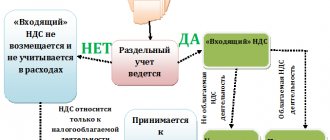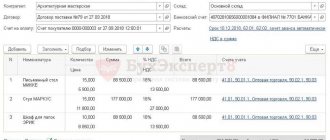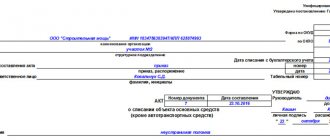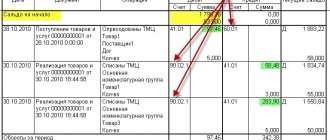Home/Trade/VAT on goods
A certain list of goods is not subject to VAT - this is a fairly wide list of medical and other goods, the imposition of additional taxes on which is inappropriate. In addition, there are specific types of activities and business support measures that also imply tax exemption or rate minimization. The situation around VAT is recognized by experts as ambiguous, and the tax itself is difficult to calculate and account for, which does not exclude, but rather emphasizes the need for its detailed study.
Attention! If you have any questions, you can chat for free with a lawyer at the bottom of the screen or call Moscow; Saint Petersburg; Free call for all of Russia.
What is VAT?
VAT (Value Added Tax) is an indirect type of tax that is levied on a wide range of services and goods. It is calculated for the benefit of the country's budget from the surplus value. The final buyer pays tax on the entire purchase price, but the receipt of funds begins earlier, since the calculation occurs at the production stage, being added to the cost of raw materials and creation work, it is paid at all stages.
Attention
Russian legislation assumes a VAT rate of 18%, there is also a preferential rate of 10% and the possibility of a complete exemption from payment.
VAT may resemble sales or turnover tax; it is also added to the cost of goods. But unlike what was mentioned, in a situation where the buyer pays VAT, that is, buys goods whose price includes tax, the seller has the opportunity to deduct from this amount that was paid by the buyer the amount that was paid as the same tax when purchasing goods or raw materials (or using services) from a supplier. That is, the tax in practice turns out to be indirect, and it is the end consumers who pay it. In payment documents, VAT on goods appears as a separate line. This system was not developed by chance, and its use allows you to achieve several goals at once:
- Tax payment is distributed across the stages of production and commerce processes, which eliminates the cascading effect of multiple collections. This eliminates VAT overpayments, which could be very significant.
- The tax is paid by several payers, the responsibility is distributed. Evading VAT on goods using simple methods is impossible; the payment will still go to the budget - if one of the participants in the process evades it, it will still be withdrawn at subsequent stages.
- As part of the current economic situation, it removes national taxes on exports, allowing you to receive an indirect tax.
Commentary to the Letter of the Ministry of Finance of Russia dated June 18, 2019 No. 03-07-11/44274.
Real estate construction involves significant costs for the acquisition of goods, works and services. Therefore, the developer (investor) cannot but be interested in the right to apply VAT deductions. Meanwhile, the use of this right is made dependent on the possibility of carrying out VAT-taxable transactions. Thus, residential real estate developers are initially deprived of the opportunity to claim “input” tax for deduction, because the fulfillment of obligations under the DDU, as well as the sale of apartments and the transfer in this regard of shares in the right to common property in an apartment building are exempt from VAT.
The procedure is as follows.
During the construction period, VAT amounts presented by contractors and sellers of goods (works, services) are accepted for deduction in full in accordance with clause 6 of Art. 171 of the Tax Code of the Russian Federation and clauses 1 and 5 of Art. 172 of the Tax Code of the Russian Federation. Mandatory conditions are the availability of primary documents and invoices and acceptance of purchases for accounting.
After putting the property into operation, the amounts of VAT accepted for deduction are subject to restoration and payment to the budget within 10 years, starting from the year in which depreciation began to accrue on this object. The calculation of the amount of VAT subject to restoration and payment to the budget for each calendar year of 10 years is based on 1/10 of the amount of tax accepted for deduction, in the corresponding share, which is determined based on the cost of goods shipped (work performed, services rendered), not subject to VAT, in the total cost of goods (work, services) shipped (transferred) for the calendar year. This procedure is established in paragraphs 4 and 5 of Art. 171.1 Tax Code of the Russian Federation.
Regulatory authorities note that in relation to immovable fixed assets, VAT is restored in accordance with Art. 171.1 of the Tax Code of the Russian Federation, and not clause 3 of Art. 170 of the Tax Code of the Russian Federation, which applies only to movable fixed assets.
Let us remind you that according to clause 3 of Art. 170 of the Tax Code of the Russian Federation, the amount of restored tax:
determined based on the residual value of the object without taking into account revaluation;
is not included in the cost of the fixed asset, but is taken into account as part of other expenses (Article 264 of the Tax Code of the Russian Federation).
Moreover, the restoration of tax amounts is made at a time in the quarter in which the object begins to be used by the taxpayer to carry out the operations specified in clause 2 of Art. 170 Tax Code of the Russian Federation.
As you can see, there is a big difference between the rules applied when restoring VAT in relation to movable and immovable fixed assets.
Let us note one more important nuance. In paragraph 3 of Art. 171.1 of the Tax Code of the Russian Federation it is noted that the restoration procedure established by this article applies to cases when real estate objects are subsequently used by this taxpayer to carry out the operations specified in paragraph 2 of Art. 170 of the Tax Code of the Russian Federation , with the exception of fixed assets that are fully depreciated or at least 15 years have passed since their commissioning for such a taxpayer. The Federal Tax Service in Letter dated May 21, 2015 No. GD-4-3/ [email protected] emphasized: provided for in Art. 171.1 of the Tax Code of the Russian Federation, the restoration procedure also applies when real estate objects begin to be used only in transactions not subject to VAT .
In other words, specified in Art. 171.1 of the Tax Code of the Russian Federation, the procedure for recovering VAT on real estate is universal, applicable to a wide variety of situations. In addition, from the explanations of the regulatory authorities, it can be concluded that there should be no problems with the use of deductions in full.
Please note: taking into account the available letters from the Ministry of Finance and the Federal Tax Service, we can conclude that when purchasing movable fixed assets intended for carrying out transactions, both taxable and non-taxable to VAT (exempt from taxation), only part of the “input” tax should be deducted . In the case of the construction and acquisition of a real estate fixed asset that will be used in both taxable and non-VAT-taxable transactions (or in transactions subject to VAT, exempt from VAT, and in activities subject to UTII), “input” VAT is declared deductible in full. And in the future, upon actual use of real estate, VAT is restored within 10 years in the manner prescribed by Art. 171.1 Tax Code of the Russian Federation.
This is important to know: Deduction of VAT amount calculated from advances
Meanwhile, the approach outlined by the Ministry of Finance and the Federal Tax Service is not shared by all local tax authorities. And more importantly for taxpayers, some courts disagree.
Let's look at a few examples from judicial practice.
What goods are not subject to VAT?
There are a number of categories and areas of goods that are not subject to VAT. These are, first of all, areas of social orientation, as well as socially significant goods that should not be provided within the framework of normal market competition due to the fact that this will affect certain segments of the population. Also, this tax is not relevant for a number of business areas, for a sector that requires development and support. By imposing VAT on goods, an import substitution program is being implemented, making it possible to push foreign manufacturers out of the market, providing a place for our own. Moving on to specifics, it is worth listing the following goods that are exempt from payment within the scope of goods and services provided by them:
- Food and related products.
- Food for medical, educational institutions, direct producers.
- Stamps, postcards with stamps, mail envelopes.
- Scrap metal and metal waste, ores, valuable metals and their concentrates.
- Any goods in duty free.
- Diamonds that have not undergone treatment.
- Precious coins that are not accepted for payment.
- Medical products according to the existing list.
- Goods for free assistance.
- Religious goods and literature.
Educational services
Situation: can an organization use VAT benefits when providing services in the field of education (conducting lectures, seminars, etc.) if, based on the results of training, it does not conduct certification and does not issue educational documents?
Only non-profit organizations can use VAT benefits when providing services in the field of education (subclause 14, clause 2, article 149 of the Tax Code of the Russian Federation). Therefore, if educational services are provided by a commercial organization, it is obliged to charge VAT on their entire cost.
Non-profit organizations are exempt from taxation when selling educational services within the framework specified in the licenses:
- general education programs;
- professional (main and (or) additional) educational programs;
- vocational training programs or educational process.
A complete list of services for the implementation of educational programs is given in the appendix to the regulations on licensing of educational activities, approved by Decree of the Government of the Russian Federation of October 28, 2013 No. 966.
In addition, VAT is not assessed on the sale of additional educational services that, in terms of level and focus, correspond to the programs specified in the license.
If an organization licensed for educational activities, as part of this activity, conducts one-time classes in the form of lectures, seminars, internships, then these additional educational services are also not subject to VAT.
Similar clarifications are contained in the letter of the Ministry of Finance of Russia dated April 28, 2012 No. 03-07-07/47.
Which goods are not subject to VAT upon import?
Tax must also be paid when importing products into the country for commercial purposes. In this sector there are also categories exempt from payment, and their full list can be seen in Art. 150 Tax Code of the Russian Federation. As an example of goods exempt from payment, one can cite technological equipment and spare parts that are not produced in Russia even within the framework of analogues. The following goods are also completely exempt from VAT when imported:
- Medicines that have no analogues, materials for their production.
- Consumables for scientific purposes that have no domestic analogues.
- Life-saving medical supplies.
- Any cultural values.
- Breeding agricultural animals, embryos.
- Items within the scope of gratuitous assistance.
- Seafood produced by domestic companies.
- Currency, securities - with the exception of collecting purposes.
- Rough diamonds.
- Objects of space activities.
- Printed products for exchange between museums and libraries.
- Goods produced by Russian companies operating abroad.
- Vessels for registration in Russia.
Resolution of the AS ZSO dated November 16, 2016 in case No. A45-100/2016.
The organization carried out several types of activities:
sale of cars (transaction subject to VAT);
provision of warranty repair services for cars (an operation exempt from VAT on the basis of clause 13, clause 2, article 149 of the Tax Code of the Russian Federation);
provision of repair, maintenance and washing services for vehicles subject to UTII.
In connection with the acquisition of the dealership and boiler room, the organization declared VAT deductible in full.
The tax authority pointed out that the amount of the deduction was overstated, since the acquired real estate was used in activities both subject to and not subject to VAT. According to the inspectors, the company should have calculated the amount of the deduction in proportion to the revenue from taxable activities (clause 4 of Article 170 of the Tax Code of the Russian Federation).
The tax dispute was resolved in favor of the inspectorate. At the same time, in court decisions the idea was expressed that Art. 171.1 of the Tax Code of the Russian Federation regulates the procedure for the restoration of VAT in cases where the taxpayer initially lawfully applied tax deductions, and then circumstances arose that entailed the obligation to restore the tax amounts previously accepted for deduction. The arbitrators emphasized:
All cases giving the right to a deduction are listed in Art. 171 of the Tax Code of the Russian Federation, there is no provision in it that provides the right to deduct the entire amount of VAT on acquired real estate in the presence of the circumstances specified in clause 2 of Art. 170 Tax Code of the Russian Federation;
the article itself 171.1 of the Tax Code of the Russian Federation does not establish the taxpayer’s right to apply tax deductions.
How to calculate VAT on a product?
In order to calculate VAT on a product of any amount, there is a simple mathematical formula.
NB × Nst / 100
NB - tax base, total amount, Nst - rate, which can be equal to 18 or 10.
If it is necessary to calculate VAT, including in order to isolate the tax from the total amount, use the following formulas:
C/1.18 × 0.18 (or × 0.10)
C / 1.10—if the tax rate is 10%,
C - total amount including VAT.
When calculating the amount including VAT without first calculating the tax, the following formula is used:
C = NB × 1.18 (or 1.10)
NB - tax base, the total amount excluding tax.
Who is exempt from paying VAT?
Art. 149 of the Tax Code of the Russian Federation emphasizes that it is not the organization that is exempt from taxes, but only certain operations. The list of actions falling under the exemption is closed, and if the company’s work is related to the implementation of the listed operations, then it will not have to pay VAT. The list of activities that are exempt from payment includes the sale of medical goods of domestic and imported origin, shares in the capital of a company, and securities. Rights to inventions, industrial designs, databases, know-how, and results of intellectual activity are sold without VAT. Payments within banking transactions are excluded.
IMPORTANT
According to Art. 149 of the Tax Code of the Russian Federation, there are certain conditions that will allow you to obtain an exemption - licenses and other supporting documents. In order to implement the exemption, it is necessary to ensure compliance with the conditions under Art. 149 of the Tax Code, however, it is not necessary to send a notification to the tax authorities or issue an exemption.
As specified in paragraph 3 of Art. 149 of the Tax Code of the Russian Federation, operations always have the possibility of refusal under clause 5 of Art. 149 of the Tax Code of the Russian Federation, and such a measure can bring certain benefits, allowing the payer not to keep separate records and apply tax deductions.
Additional Information
To be able to use this approach, you should apply before the first day of the tax period and refuse or suspend the VAT exemption on goods. In order to do this, you must submit an application to the Federal Tax Service. At the same time, you can refuse both in relation to all operations, and for one or several; in this regard, any decisions are open without exception. According to the law, refusal is allowed for a year; shorter periods are not considered.
VAT benefits in 2020
According to the general rules, in 2020, companies and individual entrepreneurs still have the right not to tax the sale of goods, works, and services specified in Art. 149 of the Tax Code of the Russian Federation. This is an opportunity for all categories of payers, and not for certain groups, so it is wrong to consider VAT exemption as a benefit. We can only talk about the changes that have occurred this year.
So, on the basis of paragraph 3 of Art. 174.2 of the Tax Code of the Russian Federation, enterprises and individual entrepreneurs to whom electronic services on the territory of the Russian Federation are supplied by a foreign company have ceased to have the status of tax agents, and now the obligation to pay VAT rests with the service provider (clause 3 of Article 174.2 of the Tax Code of the Russian Federation).
From the beginning of 2020, the benefit previously applied for the sale of waste paper has been cancelled. The buyer must now charge VAT, since he becomes a tax agent, and he will have to act in the same way as when purchasing scrap metal (clause 8 of Article 161 of the Tax Code).
Companies and businessmen using the Unified Agricultural Tax became VAT payers from 01/01/2019. But they can also be exempt from tax if they declare this in the same year when the transition to the Unified Agricultural Tax took place, or if their income from agricultural activities under the Unified Agricultural Tax did not exceed 100 million rubles in 2018, and 90 million rubles in 2020. ., in 2020 – 80 million rubles, in 2021 – 70 million rubles, and from 2022 onwards – 60 million rubles. (Clause 1 of Article 145 of the Tax Code of the Russian Federation).
Organizations participating in innovation projects, including Skolkovo, have the right to be exempt from VAT for 10 years from the date of receipt of participant status (Article 145.1 of the Tax Code of the Russian Federation). The exemption is valid until the company’s annual revenue exceeds 1 billion rubles, and its profit in the same year does not exceed 300 million rubles.
Among the non-taxable transactions there are also those that can only be carried out within the framework of licensed activities. Therefore, if a company does not have the appropriate license, then it will not be able to apply the tax exemption. In addition, it is important to remember that enterprises and individual entrepreneurs acting in their own interests, and not being commission agents, guarantors or intermediaries, can take advantage of the VAT exemption.
Calculation example
To understand all the intricacies of calculation, it is worth considering a practical example of calculating VAT on a product. Let’s say that a certain enterprise sells piece building materials, the cost of which per unit of goods is 55 rubles, without including tax in the price. Since we are talking about building materials, tax must be paid, the rate will be 18 percent. It is necessary to calculate VAT and the total cost of the shipment when taking this tax into account.
First, you need to calculate the total cost of the goods without VAT, and if there are 100,000 pieces in the batch. goods for 55 rubles, then it will be 5,500,000 rubles. Next, you need to calculate VAT: 5,500,000 × 18/100 = 990,000 rubles. By adding VAT to the cost of the batch, you can get an amount of 6,490,000 rubles.
For your information
In this case, when filling out the documents, you must indicate that without VAT the product costs 5,500,000 rubles, 18% VAT - 990,000 rubles, with VAT - 6,490,000 rubles. This data will be quite sufficient.
Separate VAT accounting: taxable and non-taxable transactions
Elena Dadasheva, internal auditor of AirUnion LLC (alliance of air carriers).
In the course of their activities, enterprises can carry out both taxable and non-taxable value added tax transactions. In this case, the Tax Code prescribes the use of a special procedure for accounting for “input” VAT - tax amounts paid to suppliers of goods (works, services, property rights).
We separate types of activities.
First of all, it is necessary to determine the types of activities that fall under the definition of “non-taxable transactions”, as well as the reasons for such “non-taxation”:
A). Transactions that are not recognized as an object of taxation in accordance with clause 2 of Art. 146 NK;
B). Operations for the sale of goods (works, services, property rights), the place of sale of which is not recognized as the territory of the Russian Federation in accordance with Art. 148 and 149 NK;





